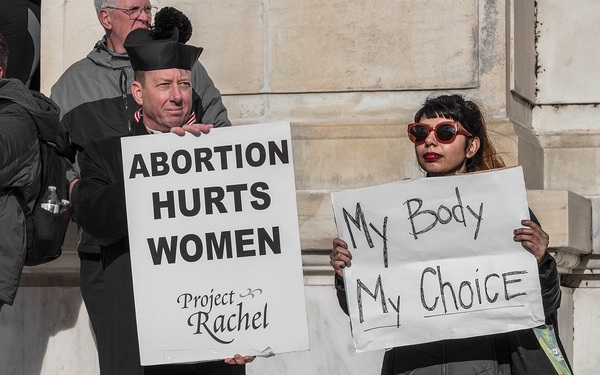
–>
June 29, 2022
Returning the abortion question ott he states is a constitutional victory. It is a beginning of restoring the separation of powers that is vital to the country. Even the late justice Ruth Bader Ginsburg noted that the manner in which Roe was determined was a judicial error. The major legal sticking point has always been that the Court is not supposed to make law, only interpret it. That has now been remedied.
‘); googletag.cmd.push(function () { googletag.display(‘div-gpt-ad-1609268089992-0’); }); }
But the devil is always in the details and the following issues will need to be seriously addressed for there to be a modicum of peace in the land.
- If a state prohibits abortions altogether, will a licensed doctor go to jail if s(he) performs an abortion?
- Will there be an exodus of Ob/Gyn doctors from a state that bans abortion thus leaving pregnant women without proper medical care?
- Will women who obtain an abortion in a non-abortion state be jailed?
Tamia Perez explains that
Abortion is now illegal, soon to be illegal, or potentially illegal in as many as 20 states.
‘); googletag.cmd.push(function () { googletag.display(‘div-gpt-ad-1609270365559-0’); }); }
In Alabama, a near-total ban on abortion could be enjoined in which abortion is only legalized to save the life of the pregnant person.
In Idaho, abortions are temporarily legal. However, all abortions will become illegal… except in cases of rape, incest, and to save the life of the pregnant person.
In Kentucky, Louisiana, South Dakota and Texas all abortions are now illegal except to save the life of the pregnant person.
Will there be a return to the backroom abortions that existed before abortion was legalized?
Will religious communities be at odds with a state’s ruling on abortion? Will anti-choice laws collide with Jewish law, for example?
Rabbi Rachael Pass asserts that “[i]f anyone tries to argue that abortion restrictions are justified under the prerogative of religious freedom, we can explain that our religious freedom demands that we have access to abortion care when it is needed and wanted.’
‘); googletag.cmd.push(function () { googletag.display(‘div-gpt-ad-1609268078422-0’); }); } if (publir_show_ads) { document.write(“
In fact, according to Rabbi Rob Scheinberg of Hoboken, N.J.
In Judaism, the fetus does not have the same rights of personhood as the mother, at ANY point during pregnancy. The idea that full rights of personhood kick in at the moment of conception is an idea that can be found in Christian writings… but it is not an idea that you can find in traditional Jewish texts.
The Orthodox Union. has written that “Jewish law prioritizes the life of the pregnant mother over the life of the fetus such that where the pregnancy critically endangers the physical health or mental health of the other, an abortion may be authorized, if not mandated, by Halacha [Jewish law] and should be available to all women irrespective of their economic status. Legislation and court rulings — federally or in any state — that absolutely ban abortion without regard for the health of the mother would literally limit the ability for Orthodox Jews to live in accordance with the responsibility to preserve life.”
Moreover, some states are only considering physical health and are specifically excluding mental health. However, the mental anguish of the pregnant woman has been considered as part of the decision-making criteria for abortion in Jewish law.
How will this affect the treatment of and religious freedom of the Orthodox Jewish community as they grapple with new laws that restrict and bar them from following Jewish law? Will pregnant women now avoid prenatal care where “every miscarriage is treated as a potential criminal investigation?”
In Islam, “Muslim scholars have categorized the permissibility of abortion or lack thereof based on the time period and circumstances. They divided the pregnancy into three main periods.
Abortion during the first 40 days after conception is quite flexible. Additionally, abortion is allowed in cases of rape or if the parents are physically or mentally unable to raise a child. However, fear of poverty is not a legitimate reason to abort a child.
After 40 days Muslim scholars have differed on the permissibility of abortion. After the first 120 days, it is believed that the child is given a soul. It is therefore categorically forbidden to abort the child unless the mother’s life is in danger. Abortion is also allowed if the fetus passes away in the mother’s womb.
 Will one religious view create secular law that prohibits permissible abortions within other religions?
Will one religious view create secular law that prohibits permissible abortions within other religions?
Depending upon a state’s laws, will liberal Christians flock to one state over another, thus further polarizing Christians? On the other hand, how will the return to the sanctity of the preborn affect religious institutions and the culture as a whole? Will the decision strengthen traditional Church and church-affiliated schools as they pit themselves against churches that have swung Left over the years?
In a completely different vein, will the Supreme Court decision usher in a new approach to relationships? Emily Jashinsky asserts that “whether you’re religious or not, sex reserved for loving and committed relationships is the healthiest norm for women. But with easy abortion access, casual sex increased, leaving more women pregnant outside of marriage or other committed relationships.”
Moreover, what, if any, effects will this new decision have on the demographics and economics of the country?
Americans are having fewer and fewer babies, a new government report finds. In fact, we now aren’t making enough babies to replace ourselves.
In fact, “the latest data show a current rate of… 16 percent below the number needed to keep the population stable without additions through immigration.”
How will the new decision affect the economic wherewithal of individual states and of the country as a whole?
How will the militant Left use the decision to further divide the country? Will the culture wars afflicting the nation be reduced? Will children “perceive that they are growing up in a society that tells them life has value and deserves protection?”
- Will more babies be available for adoption?
- Will more babies need to be placed in orphanages?
Yet, as the states enact their own decisions, will there be a movement for Congress to enact a law legalizing abortion again throughout America?
Ultimately, as explained here in this Dallas News editorial “it is possible to imagine a history wherein the nation’s political process could move toward a federal law that recognizes both a woman’s right to electively end a pregnancy in its early stages and that strikes the intuitive moral balance that so many people have come to accept.”
Note that Roe… and Mississippi’s Gestational Age Act — the law that led to Roe’s undoing – both accept that abortion at some stage should be legal.
And they both identify a stage in pregnancy after which elective abortion can be or will be prohibited.
It will “require genuine democratic consideration of a federal standard that places clear limits on elective abortion but does not prohibit it in the first trimester.”
Wholesale prohibitions on abortion would force rape victims to carry their attacker’s child. Yet, “the idea of abortion as simply another medical procedure between a woman and her doctor, as routine as any other procedure, is untenable.”
For many, the idea of a “federal standard” harkens back to too much control over states rights. For others, it sounds enticing: would it prohibit late-stage abortions that seem to animate many Democrat-controlled states?
The law… must arise from a democratic process at the federal level. It will not resolve every difference. But leaving the question to the states will only divide our nation further.
Ultimately, how will America balance this “most serious moral concern?”
Eileen can be reached at [email protected]
Image: James McNellis
<!– if(page_width_onload <= 479) { document.write("
“); googletag.cmd.push(function() { googletag.display(‘div-gpt-ad-1345489840937-4’); }); } –> If you experience technical problems, please write to [email protected]
FOLLOW US ON
<!–
–>
<!– _qoptions={ qacct:”p-9bKF-NgTuSFM6″ }; ![]() –> <!—-> <!– var addthis_share = { email_template: “new_template” } –>
–> <!—-> <!– var addthis_share = { email_template: “new_template” } –>







